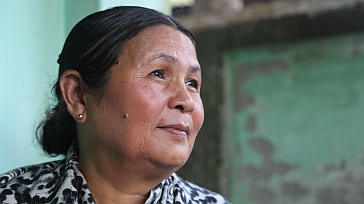International Day of the World’s Indigenous Peoples
Building bridges for indigenous people in Bangladesh
On the occasion of the International Day of the World’s Indigenous Peoples, we spoke to Sulekha Mrong, an indigenous Garo woman from the rolling hills of north-eastern Bangladesh. She explains how an ILO initiative helps indigenous people to better understand their rights as well as forge positive relationships with government authorities.

“We work for indigenous women and men. To empower them, to promote their rights, to unite them,” explains the 52-year-old retired school teacher.
The Garo are one of the main indigenous communities in Bangladesh. They live in the north-eastern part of the country. But with illegal settlements of non-Garo people encroaching into the forests and multiplying land dispute claims, the Garo have become marginalized in their own traditional lands. They face many challenges to their property and human rights.
An ILO initiative, Building Capacities on Indigenous and Tribal Peoples’ Issues in Bangladesh: Rights and Good Practices supported by the government of Denmark has been working with indigenous communities and the government authorities in Bangladesh, to create greater awareness of the rights and responsibilities of indigenous peoples.
The Achiki Michik Society (AMS), a society for Garo indigenous women, was supported by the project to organize training and workshops on indigenous rights and conventions. As a local AMS leader, Sulekha Mrong’s participation ensured that this knowledge was passed on to others in the community.
At the ILO workshops, the Garo were also introduced to elected officials and forest department representatives, building bridges between the indigenous people and the authorities.
“Now we understand that there are local level services available for indigenous people. We consulted different administration bodies with that information. In the beginning, they did not want to listen to us. We did not leave their doors though, we continued to consult them, applied for their services using their criteria and gradually they listened to us.”
“They began to understand what we are doing and allow us to discuss issues,” she said.
The Garo are one of the few remaining matrilineal societies in the world. Inheritance goes to the women and the Garo children take their surname from their mother. This creates additional responsibilities for the Garo women, which, Sulekha explained, they were not always well-equipped to understand.
“As an Indigenous Garo woman, I inherit land. We didn’t actually know about land management though; we just knew about the tradition. Through the support from the ILO, we’ve learned how we can manage and document our land and how we can exercise our traditional rights in non-traditional structures. We understand how to update land documents, how to communicate with land officers, what rights we have about our lands.”
Creating a better understanding
ILO Bangladesh Country Director Srinivas Reddy agrees that the situation is gradually improving.“The changes taking place in recent years indicate a brighter future for indigenous people in Bangladesh. ILO will continue to provide support in this area while at the same time encouraging the government to fully implement policies and agreements that have been signed relating to them,” he said.
Sulekha meanwhile is confident that the project’s activities have helped create a better relationship between indigenous people and the authorities.
“The space between us is slowly reducing. It is helping both of us, just knowing each other. When we want to discuss issues now, officials are starting to give us space. There has always been an unequal relationship. The training is helping to put us on the same page, when it was not even the same book before.”